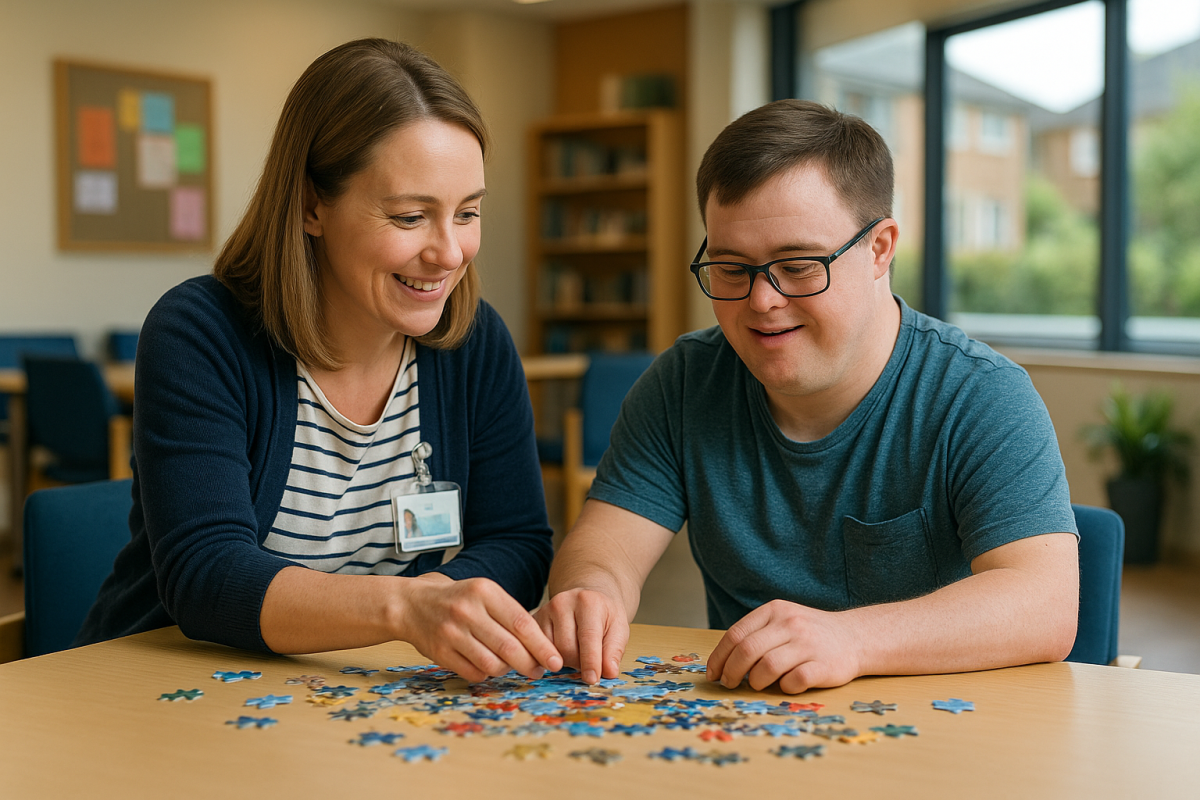Careers in Intellectual Disability Practice
Starting a career in intellectual disability support in Ireland typically begins with a nationally recognised qualification, such as QQI Level 5 in Disability Studies or Healthcare Support. Once certified, you can apply for entry-level disability care jobs, eventually progressing into specialised roles within community health services.
With that in mind, let’s look at how you can begin a career in intellectual disability practice in Ireland.
Understanding the Intellectual Disability Practice Industry
Intellectual disability practice is a vital sector within Ireland’s healthcare and social services landscape. Professionals in this field provide essential care and support to individuals with intellectual disabilities, helping them lead fulfilling lives with dignity and independence.
People working in intellectual disability support careers play a central role in community-based care, aligned with Ireland’s ongoing shift away from institutional care towards inclusive, community-focused services. This transition is supported by policy frameworks such as the HSE’s New Directions programme and aligns with the wider goals of promoting equality and person-centred care.
Jobs in this sector are varied and growing in demand, especially as more families, care organisations, and government agencies prioritise tailored support solutions. Whether working in residential homes, day centres, or directly with families, a career in this area offers meaningful, long-term opportunities.
Core Responsibilities of a Career in Intellectual Disability Practice
Professionals working in intellectual disability support are expected to carry out a range of duties that promote the well-being and development of individuals. The nature of the work may vary slightly depending on the role, setting, or level of experience, but core responsibilities include:
Support with daily living skills: Assisting individuals with personal care, meal preparation, financial management, and household tasks, always encouraging independence wherever possible.
Creating inclusive environments: Promoting social inclusion by supporting individuals in participating in community-based programmes, education, and social events across Ireland.
Implementing care plans: Working collaboratively with multidisciplinary teams, families and healthcare professionals to put person-centred care plans into practice.
Administering medications: Following HSE approved protocols and ensuring safe and responsible medication administration as required for certain roles.
Monitoring and reporting: Keeping accurate records on a client’s health, behaviour, and participation in activities, flagging any changes or concerns to relevant supervisors or clinical staff.
Advocacy and safeguarding: Supporting service users in understanding their rights and ensuring they are protected from harm or abuse in accordance with Irish safeguarding guidelines.
Essential Soft Skills
While formal qualifications open the door to community health services jobs in Ireland, your personal attributes will ultimately determine how successful and effective you are in this field. The following soft skills are particularly important in disability support worker career paths:
Empathy and patience: Understanding the diverse needs of people with intellectual disabilities requires a kind, non-judgemental approach and the ability to remain calm in challenging situations.
Communication: The ability to clearly and respectfully communicate, often using alternative or non-verbal methods, is key to building trusting relationships with service users and colleagues.
Teamwork: Working in community health in Ireland often involves collaborating closely with colleagues, families, and other professionals to provide holistic care.
Resilience: Intellectual disability support careers can be emotionally demanding, so staying positive, emotionally strong and adaptable is critical.
Attention to detail: Monitoring health signs, responding to individual needs, and maintaining accurate records all require consistent focus and precision.
Steps to Becoming a Career in Intellectual Disability Practice in Ireland
Step 1: Begin with a relevant QQI Level 5 course – such as Healthcare Support or Intellectual Disability Studies. These qualifications are essential for most entry-level disability care jobs in Ireland and are often required by HSE-funded organisations.
Step 2: Gain practical experience through work placements or volunteering. Many accredited QQI Level 5 courses include supervised placements in care settings, giving you valuable real-world exposure.
Step 3: Apply for positions such as healthcare assistant (intellectual disability) or support worker roles within disability services. Search both public job boards and through not-for-profit organisations such as St Michael’s House, RehabCare or Cope Foundation.
Step 4: Register with the HSE Job Portal and also explore vacancies with service providers funded under Section 39 of the Health Act.
Step 5: Continue professional development by pursuing advanced QQI Level 6 qualifications or exploring additional certificates in autism awareness, person-centred planning, and medication management.
Step 6: With experience and further education, you can progress into specialised roles such as behavioural therapists, team leaders, or service coordinators, allowing for long-term career progression in disability services.
Salaries and Career Growth
Salaries in intellectual disability job opportunities vary depending on experience, location, and the type of organisation. Roles within the HSE or funded agencies are subject to public pay scales.
Entry-level (e.g., Healthcare Assistant with QQI Level 5): €28,000 – €34,000 annually
Mid-level (e.g., Experienced Support Worker): €35,000 – €42,000 annually
Senior-level (e.g., Team Leader or Programme Coordinator): €45,000 – €55,000 annually
Career progression in disability services can take many forms — from moving into supervisory or management roles to specialising in areas such as behavioural support, care coordination, or policy development. Some professionals also transition into social work or nursing following additional qualifications.
Courses and Certifications
Most intellectual disability support careers in Ireland require at least a QQI Level 5 qualification. Some of the most relevant QQI-accredited courses for this field include:
- QQI Level 5 Healthcare Support
- QQI Level 5 Intellectual Disability Studies
- QQI Level 5 Nursing Studies (for those progressing into nursing careers)
You can also enhance your skills with shorter QQI-certified modules, such as:
- Communication in Healthcare
- Infection Prevention and Control
- Care of the Older Person
If you would like to find out more about certification and the courses available to you, just get in touch or complete the form below.
Useful Links
CitizensInformation.ie – Disability Support Services


